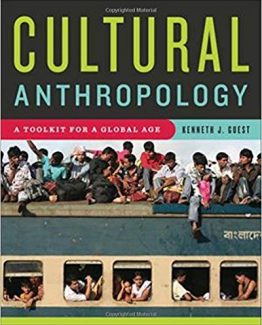The Anthropology of Language: An Introduction to Linguistic Anthropology 4 Edition, ISBN-13: 978-1337571005
[PDF eBook eTextbook]
- Publisher: Cengage Learning; 4th edition (January 2, 2018)
- Language: English
- 416 pages
- ISBN-10: 9781337571005
- ISBN-13: 978-1337571005
Learn the methodology, skills, techniques, tools and applications of Linguistic Anthropology with THE ANTHROPOLOGY OF LANGUAGE: AN INTRODUCTION TO LINGUISTIC ANTHROPOLOGY. This highly readable introductory text emphasizes the kinds of intriguing questions that anthropologists ask about language. The fourth edition brings together the key areas of linguistic anthropology, addressing issues of power, race, gender and class throughout. “In the Field” vignettes draw you into the chapter material and are culled from authors Ottenheimer and Pine’s own experiences, among others. Other features–“Doing Linguistic Anthropology” and “Cross-Language Miscommunication”–describe some of the real-life applications of concepts discussed in the text, helping you cement your understanding of the concepts and their relevance.
Table of Contents:
1. Linguistic Anthropology.
2. Language and Culture.
3. The Sounds of Language.
4. Words and Sentences.
5. Sign Language and Nonverbal Communication.
6. Language in Action.
7. Writing and Literacy.
8. How and When is Language Possible?
9. Change and Choice.
10. Doing Linguistic Anthropology.
Harriet Joseph Ottenheimer, professor emeritus of anthropology at Kansas State University, received a B.A. at Bennington College and a Ph.D. at Tulane University. She has taught linguistic anthropology for over 30 years. Her research interests include music, language, and other creative and performative expressions, particularly in African American and African cultures. In addition to extended periods of field research in New Orleans and the Comoro Islands, Dr. Ottenheimer has traveled and lectured widely throughout many other parts of the world. She has special interests in blues, autobiography, transcription, dictionary construction, fieldwork ethics, and ethnicity. Among her publications are COUSIN JOE: BLUES FROM NEW ORLEANS (with Pleasant “Cousin Joe” Joseph), a blues singer’s autobiography; THE HISTORICAL DICTIONARY OF THE COMORO ISLANDS (with Martin Ottenheimer), an encyclopedia; MUSIC OF THE COMORO ISLANDS: DOMONI (also with Martin Ottenheimer), in vinyl, cassette, and CD formats; and SHINZWANI-ENGLISH/ENGLISH-SHINZWANI DICTIONARY, a bilingual, bidirectional dictionary. She has taught at the University of New Orleans, at Charles University in Prague (on a visiting Fulbright appointment), and at Kansas State University. At KSU she was the founding director of the interdisciplinary American Ethnic Studies Program, teaching introductory and advanced courses in that program, as well as in cultural and linguistic anthropology. Dr. Ottenheimer has received the Kansas State University President’s Award for Distinguished Service to Minority Education, and the Charles Irby Award for Distinguished Service to the National Association for Ethnic Studies. She has served as president of the National Association for Ethnic Studies and the Central States Anthropological Association. She speaks five languages: English, Spanish, French, Russian, and Shinzwani. She is attempting to learn to speak and read Czech.
Judith M.S. Pine is an associate professor of Anthropology at Western Washington University, where she teaches introductory and advanced Linguistic Anthropology courses, qualitative field methods and Asia-focused courses. She is a member of the Department of Anthropology and is affiliated with the Interdisciplinary Linguistics Program and the East Asian Studies Program. Dr. Pine has taught Linguistic Anthropology for over 15 years, and her research interests include literacies, indigeneity, semiotics and the performance of identity, particularly in Southeast Asia. Her primary research site is a small village in rural northern Thailand, and her work with the Lahu people has taken her from rural Thailand to densely urban Kunming, China. Dr. Pine’s current research focuses on Lahu language music videos which circulate throughout the Greater Mekong Subregion–an area which includes mainland southeast Asia and portions of southwest China. Dr. Pine received a B.A. in Anthropology from Kansas State University and a Ph.D. at the University of Washington. She speaks English, Spanish, German, Thai and Lahu–and hopes to add Mandarin to that list very soon.
What makes us different?
• Instant Download
• Always Competitive Pricing
• 100% Privacy
• FREE Sample Available
• 24-7 LIVE Customer Support





